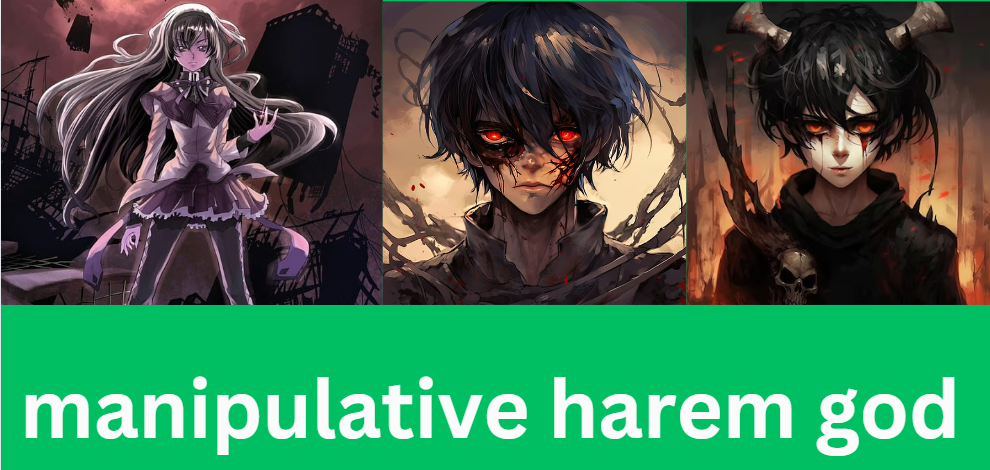In the realm of fantasy fiction, certain themes captivate audiences more than others—power, manipulation, and complex relationships are among the most intriguing. One character who embodies these themes is Zhang Wei, often referred to as the “Manipulative Harem God.”
His story is a compelling blend of tragedy, ambition, and a deep exploration of human psychology. In this article, we will delve into the origins, evolution, and impact of Zhang Wei’s character, offering insights and analyses that go beyond existing online resources.
Contents
- 1 The Tragic Origins of Zhang Wei: From Orphan to Survivor
- 2 The Emergence of the Manipulative Harem God
- 3 The Psychological Depth of Zhang Wei: Understanding the Manipulative Harem God
- 4 The Impact of Zhang Wei: The Manipulative Harem God in Popular Culture
- 5 The Ethical Dilemma of Zhang Wei’s Manipulation
- 6 Zhang Wei’s Redemption: Is It Possible?
- 7 FAQs About Manipulative Harem God
- 8 Conclusion
The Tragic Origins of Zhang Wei: From Orphan to Survivor
A Childhood Shattered by Tragedy
Zhang Wei’s journey begins with a profound tragedy that shapes his entire existence. At the tender age of eight, Zhang Wei lost both of his parents under mysterious and violent circumstances. The exact details of their deaths are shrouded in ambiguity, but what is clear is that this event thrusts Zhang Wei into a life of uncertainty and fear. His small village, once a haven, becomes a place of danger as he finds himself on the run, fearing capture by the authorities.
This traumatic event is crucial in understanding the development of Zhang Wei’s character. It instills in him a deep-seated fear of vulnerability and a desperate need for control—two elements that later define his manipulative nature.
Escaping the Village: The Birth of a Survivor
Forced to flee his home, Zhang Wei’s early life is marked by a constant struggle for survival. His journey from the village is not just a physical escape but also a psychological transformation. The fear of being caught, the need to outsmart those who pursue him, and the necessity of relying on his wits and cunning shape his personality.
During this period, Zhang Wei learns to trust no one. He develops an acute sense of awareness, becoming hyper-vigilant and calculating in every decision he makes. These traits, while initially tools for survival, eventually evolve into the manipulative tendencies that define his later actions.
The Emergence of the Manipulative Harem God
Discovering the Power of Manipulation
As Zhang Wei grows older, he begins to realize the power of manipulation. His early experiences taught him that brute strength alone is not enough to survive in a world filled with dangers and uncertainties. Instead, he learns to wield his intellect and emotional understanding as weapons.
Zhang Wei’s first forays into manipulation are subtle—convincing others to do his bidding without them realizing it. He becomes adept at reading people, understanding their desires, fears, and weaknesses, and using this knowledge to influence their actions. What starts as a survival mechanism quickly becomes a way of life.
The Harem: A Symbol of Control
One of the most controversial aspects of Zhang Wei’s character is his establishment of a harem. This harem is not just a collection of romantic interests but a symbol of his need for control and dominance. Each member of the harem represents a different facet of Zhang Wei’s manipulative power.
Zhang Wei carefully selects each member of his harem, choosing individuals with specific qualities that he can exploit. Whether it’s a thirst for power, a desire for love, or a need for protection, Zhang Wei identifies these desires and uses them to bind these individuals to him. The harem becomes a microcosm of his manipulative abilities, where he exercises complete control over the emotions and actions of others.
The Dark Side of Power
While Zhang Wei’s manipulation brings him power, it also reveals the darker aspects of his character. His relationships are not built on mutual respect or love but on control and exploitation. This dynamic creates a toxic environment where trust is nonexistent, and betrayal is always a looming threat.
Zhang Wei’s need for control extends beyond his harem. He begins to manipulate those around him on a larger scale, using his cunning to influence political decisions, sway public opinion, and secure his position of power. However, this relentless pursuit of control comes at a cost—alienating those who might have been allies and sowing the seeds of his eventual downfall.
The Psychological Depth of Zhang Wei: Understanding the Manipulative Harem God
The Psychology of Manipulation
To truly understand Zhang Wei, one must delve into the psychology of manipulation. At its core, manipulation is about exerting influence over others in a way that benefits the manipulator, often at the expense of the manipulated. For Zhang Wei, manipulation is a means of survival, a way to protect himself from the vulnerabilities that have haunted him since childhood.
However, Zhang Wei’s manipulation is not just a defensive mechanism—it’s also a way to assert his dominance and control over others. His ability to read people, understand their desires, and exploit their weaknesses gives him a sense of power that he craves. This need for power is a direct response to the powerlessness he felt as a child, making his manipulation both a psychological defense and an assertion of his identity.
The Role of Trauma in Shaping Zhang Wei’s Character
Zhang Wei’s traumatic childhood plays a crucial role in shaping his manipulative tendencies. The loss of his parents and the subsequent need to survive on his own create a deep-seated fear of vulnerability. To cope with this fear, Zhang Wei develops a hyper-vigilant personality, always on the lookout for threats and constantly seeking to maintain control over his environment.
This trauma also fuels Zhang Wei’s need for control in his relationships. Having lost the security and love of his parents, Zhang Wei seeks to recreate that sense of security by controlling those around him. However, instead of fostering genuine connections, Zhang Wei’s relationships are built on manipulation and control, reflecting his inability to trust others and his fear of being hurt again.
The Complexity of Zhang Wei’s Character
What makes Zhang Wei a compelling character is his complexity. He is not a one-dimensional villain but a deeply flawed individual shaped by his past experiences. His manipulation is not born out of malice but out of a desperate need to protect himself and assert his identity. This complexity makes Zhang Wei both a tragic and a fascinating character, as his actions are driven by both his strengths and his insecurities.
The Impact of Zhang Wei: The Manipulative Harem God in Popular Culture
A Polarizing Figure
Zhang Wei’s character has had a significant impact on popular culture, particularly within the realm of fantasy fiction. As the “Manipulative Harem God,” Zhang Wei embodies the darker aspects of power and control, making him a polarizing figure among fans.
Some view Zhang Wei as a master strategist, a character who uses his intellect and cunning to achieve his goals. Others see him as a villain, someone who exploits and manipulates those around him for his own gain. This duality has sparked numerous debates among fans and critics, with some praising his complexity and others condemning his actions.
The Manipulative Harem God as a Reflection of Real-World Issues
Zhang Wei’s character also serves as a reflection of real-world issues related to power, control, and manipulation. In many ways, Zhang Wei’s story is a commentary on the dangers of unchecked power and the toxic dynamics that can arise in relationships built on control rather than trust and respect.
In the context of popular culture, Zhang Wei’s character raises important questions about the nature of power and the consequences of manipulation. His story serves as a cautionary tale, highlighting the destructive impact of manipulation on both the manipulator and the manipulated.
The Legacy of the Manipulative Harem God
The legacy of the “Manipulative Harem God” is one of complexity and controversy. Zhang Wei’s character has left a lasting impression on the fantasy genre, influencing the portrayal of anti-heroes and characters who operate in the moral gray area.
His story has also inspired countless discussions and analyses, with fans and critics alike exploring the psychological depth and ethical implications of his actions. As a result, Zhang Wei has become an iconic figure in fantasy fiction, representing the darker side of power and the complexities of human nature.
The Ethical Dilemma of Zhang Wei’s Manipulation
The Morality of Manipulation
Zhang Wei’s actions raise important ethical questions about the morality of manipulation. While his manipulation is often justified as a means of survival, it also has far-reaching consequences for those around him. The individuals in his harem, for example, are often manipulated into situations that are detrimental to their well-being, raising concerns about the ethical implications of Zhang Wei’s actions.
From an ethical standpoint, manipulation is generally viewed as a morally questionable practice. It involves deceit and exploitation, often leading to harm for the manipulated individuals. Zhang Wei’s character challenges the reader to consider the morality of his actions and the impact of manipulation on both the individual and the larger society.
The Consequences of Manipulation
The consequences of Zhang Wei’s manipulation are far-reaching. While he may achieve short-term success and power, his actions ultimately lead to isolation and distrust. The people he manipulates, once loyal allies, begin to see through his tactics and question his motives. This erosion of trust eventually undermines Zhang Wei’s power, leading to his downfall.
In a broader sense, Zhang Wei’s story illustrates the long-term consequences of manipulation. While it may provide immediate benefits, it often leads to negative outcomes in the long run. The relationships built on manipulation are inherently unstable, as they are based on deceit rather than genuine connection.
Zhang Wei’s Redemption: Is It Possible?
The Potential for Change
One of the most intriguing aspects of Zhang Wei’s character is the question of redemption. Can a character so deeply entrenched in manipulation and control change? Is there a path to redemption for Zhang Wei, or is he doomed to remain a manipulator forever?
The possibility of redemption hinges on Zhang Wei’s ability to confront his past and acknowledge the harm he has caused. This would require a significant shift in his mindset, moving away from a need for control and towards a desire for genuine connection and trust. While difficult, this transformation is not impossible, and it opens up the possibility for a more complex and nuanced character development.
The Road to Redemption
If Zhang Wei were to seek redemption, the road would be long and challenging. It would require him to confront the trauma of his past, understand the impact of his actions on others, and make a conscious effort to change his behavior. This process would not only involve internal reflection but also external actions—seeking forgiveness from those he has wronged and working to rebuild the trust he has lost.
However, the possibility of redemption also raises questions about whether Zhang Wei’s actions can be forgiven. Can someone who has caused so much harm truly be redeemed, or are some actions beyond forgiveness? This ethical dilemma adds another layer of complexity to Zhang Wei’s character and his potential for redemption.
FAQs About Manipulative Harem God
1. What makes Zhang Wei the “Manipulative Harem God”?
Zhang Wei is referred to as the “Manipulative Harem God” due to his ability to manipulate those around him, particularly the members of his harem. He uses his intellect, understanding of human psychology, and cunning to control and dominate others, earning him this moniker.
2. Is Zhang Wei a villain or an anti-hero?
Zhang Wei is a complex character who embodies both villainous and anti-heroic qualities. While his actions are often manipulative and harmful, they are driven by his traumatic past and a desire for control. This duality makes him a morally ambiguous character, rather than a straightforward villain.
3. What are the ethical implications of Zhang Wei’s manipulation?
Zhang Wei’s manipulation raises significant ethical concerns, particularly regarding the impact of his actions on those he manipulates. His behavior is often exploitative and deceitful, leading to harm for others and raising questions about the morality of his actions.
4. Can Zhang Wei be redeemed?
The possibility of Zhang Wei’s redemption is a complex and debated topic. While there is potential for him to change and seek redemption, it would require a significant shift in his mindset and behavior, as well as a willingness to confront the harm he has caused.
5. How does Zhang Wei’s story reflect real-world issues?
Zhang Wei’s story reflects real-world issues related to power, control, and manipulation. His character serves as a cautionary tale about the dangers of unchecked power and the toxic dynamics that can arise in relationships built on manipulation.
Conclusion
Zhang Wei, the “Manipulative Harem God,” is a character who captivates and challenges audiences with his complexity, depth, and moral ambiguity. His journey from a traumatized orphan to a master manipulator is a testament to the enduring appeal of characters who operate in the moral gray area. Zhang Wei’s story is not just a tale of power and control but also a profound exploration of human psychology, the consequences of manipulation, and the possibility of redemption.
In exploring Zhang Wei’s character, we are invited to consider the darker aspects of power and the ethical dilemmas that arise when control and manipulation are used as tools for survival and dominance. Whether viewed as a villain, an anti-hero, or a tragic figure, Zhang Wei remains an iconic character in the world of fantasy fiction, offering insights into the complexities of human nature and the enduring struggle between power and morality.


